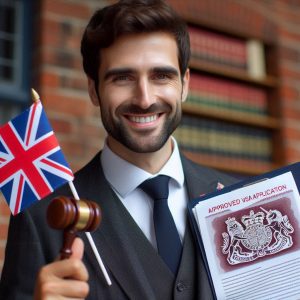UK immigration law is a complex and ever-evolving system, with new policies and stringent visa requirements regularly introduced to address changing economic and social priorities. Navigating these regulations can be challenging for foreign nationals seeking to enter the UK.
However, with expert guidance, visa applicants can better understand the requirements, avoid common pitfalls, and improve their chances of a successful outcome.
This London immigration lawyer expert guide offers essential tips to help you approach your immigration journey with confidence.
How UK Immigration Works

The UK immigration system is designed to regulate the entry, stay, and rights of foreign nationals entering the country. Immigration laws aim to attract foreign talent to drive economic growth while protecting the country’s borders to ensure national security and social cohesion.
Under the immigration system, there are a wide range of visa categories and policies tailored to individuals’ specific needs, including work, study, family, and business. Applicants must meet the eligibility criteria for their visa category, such as financial requirements, language proficiency, or sponsorship from a UK-based employer or institution.
Applications for UK visas are submitted online, often requiring supporting documents, a biometric appointment, and payment of fees, including the Immigration Health Surcharge.
The application process typically takes around three weeks for applications made from outside the UK. However, it could take longer depending on certain factors, such as the volume of applications at the Visa Application Centre and whether an applicant submits all required documentation when applying.
Understanding the basics of UK immigration can be crucial for anyone planning to move to the country.
Types of UK Visas
There are several UK visa types available, ranging from short to long-term options. The specific visa required will depend on an individual’s circumstances and purpose for entering the UK. These visas can be categorised into the following groups:
Standard Visitor Visa
The UK’s Standard Visitor Visa is a temporary non-immigrant visa that grants entry into the UK for a short period (typically up to six months) for tourism, business, family visits, medical treatment, and other short-term permitted engagements.
Family Visa
A Family Visa allows family members of a UK citizen, settled person, or refugee to join or remain with them in the UK. The UK Family Visa is a long-term visa, valid for up to 33 months and renewable for an additional 30 months. Afterwards, visa holders may apply for permanent residency.
Work and Business Visas
The UK has several work visas that allow foreign nationals to enter and work in the UK for a specific period. Work visas typically require applicants to have a job offer from a licenced employer and meet specific qualifications and salary requirements.
There is also a range of business visas that allow foreign investors, entrepreneurs, and business professionals to establish a business or invest in an existing UK business. Depending on the work or business visa type, an individual’s stay in the UK may count towards permanent residency.
Study Visa
A study visa allows international students to enter the UK to undertake a study program. It typically requires having a placement at a licenced UK institution, meeting language and academic qualifications, and having sufficient finances both for tuition and day-to-day living.
Pathways to Settlement and British Citizenship

Certain visa categories offer pathways to permanent residency or Indefinite Leave to Remain (ILR) and, eventually, British citizenship.
ILR grants individuals the right to live, work, and study in the UK without immigration restrictions. It is typically achieved after a qualifying period of continuous residence in the UK, which is usually between three to five years, depending on the type of visa.
To qualify for ILR, applicants must demonstrate their continuous residence, meet specific income or job requirements, and pass the Life in the UK Test and English language proficiency tests.
Once an individual has lived in the UK for at least 12 months after obtaining ILR, or immediately if they are married to a British citizen, they may apply for British citizenship. Applicants for citizenship must meet the good character requirement and residency criteria and affirm their loyalty to the UK.
7 Expert Tips for a Successful UK Visa Application
If you intend to apply for a UK visa, you can improve your chances of success with these tips:
1. Understand Your Visa Type
The first step in applying for a UK visa is to determine the purpose of your stay and select the corresponding visa category. It’s crucial to thoroughly review visa guidelines relating to your situation. Understand the eligibility criteria for your nationality and visa category and the required documents for your specific application.
2. Submit Your Application Early
Submitting your visa application early helps avoid last-minute issues that can affect your travel plans. Apply for your visa three to six months (depending on the visa type) before your intended travel date to allow you to beat processing queues and give you time to handle potential delays.
3. Provide Accurate Information
When applying, ensure you provide accurate and valid information on the visa application form. Also, ensure that all documents uploaded to the online portal correspond with the information on your form and contain substantial evidence that supports your visa request. Note that your documents must be in English or Welsh or a certified translation of either language.
Providing accurate information and documentation expedites visa processing, minimises delays, and reduces the risk of application refusal.
4. Show Sufficient Proof of Funds
A critical aspect of your visa application is showing that you have enough money to support yourself in the UK. Submit bank statements, pay slips, or proof of savings to show your financial stability. It’s ill-advised to deposit a large sum of money in your account just before your application. If you do, you should be able to justify such a bulk deposit during your interview.
5. Prove Your Identity
You must prove your identity to the UK Home Office as part of the visa application process. You can do so by visiting a UK visa application centre to provide your biometric information (fingerprints and photographs) or using the UK Immigration: ID Check mobile application.
6. Prepare for the Interview
If you’re scheduled for a visa interview, research common questions and practice giving concise answers about your travel plans, employment status, education, family ties, and financial stability.
Answer confidently, and don’t give false or misleading information. Dishonesty during the visa application process can lead to refusal and complications in future application processes.
7. Seek Professional Assistance
Consider seeking the services of an immigration lawyer if you find the visa application process overwhelming.
An immigration lawyer will simplify the process by providing expert guidance on eligibility criteria, documentation, and application submission. They will also track your application and keep you informed throughout, making the process less stressful and increasing your likelihood of success.
Author Profile

- Informed content writer and creator in the UK, always on the lookout for new stories, developments and trends to share.
Latest entries
 Business AdviceMarch 18, 2025Beyond Traffic Bots: Sustainable Paths to Real Business Growth
Business AdviceMarch 18, 2025Beyond Traffic Bots: Sustainable Paths to Real Business Growth BusinessMarch 4, 2025Renewable Energy in the UK – Business Opportunities Towards a Greener Future
BusinessMarch 4, 2025Renewable Energy in the UK – Business Opportunities Towards a Greener Future CryptocurrencyFebruary 19, 2025Crypto Custody Solutions Explained
CryptocurrencyFebruary 19, 2025Crypto Custody Solutions Explained BusinessJanuary 4, 2025How to Create a Personalised Professional Development Plan
BusinessJanuary 4, 2025How to Create a Personalised Professional Development Plan




